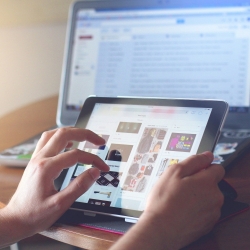August 5, 2021
Negative perceptions of remote work persist among both managers and workers
 New research from the US based Society for Human Resource Management (SHRM) claims that there are widespread, persistent negative perceptions of remote work amongst line managers who are likely to express a preference for local work. In addition, remote workers themselves continue to express reservations about losing opportunities for networking and increased pay. More than two thirds of supervisors of remote workers surveyed by SHRM, or 67 percent, admit to considering remote workers more easily replaceable than onsite workers at their organization, 62 percent believe full-time remote work is detrimental to employees’ career objectives and 72 percent say they would prefer all of their subordinates to be working in the office. (more…)
New research from the US based Society for Human Resource Management (SHRM) claims that there are widespread, persistent negative perceptions of remote work amongst line managers who are likely to express a preference for local work. In addition, remote workers themselves continue to express reservations about losing opportunities for networking and increased pay. More than two thirds of supervisors of remote workers surveyed by SHRM, or 67 percent, admit to considering remote workers more easily replaceable than onsite workers at their organization, 62 percent believe full-time remote work is detrimental to employees’ career objectives and 72 percent say they would prefer all of their subordinates to be working in the office. (more…)







 A survey of real estate and IT professionals across a range of industries claims that better remote working technology is perceived to be twice as important as workplace testing. Workplace creation specialists
A survey of real estate and IT professionals across a range of industries claims that better remote working technology is perceived to be twice as important as workplace testing. Workplace creation specialists 
 According to new data from
According to new data from 
 At 6.31 a.m. on Tuesday, December 8, 2020, the UK became the first country in the world to administer the COVID-19 vaccine. Just over five months earlier, I had been deployed to the NHS England and NHS Improvement COVID-19 vaccination programme to help drive the highly complex design and planning needed to bring the nation to this point. My role involved leading the set up and embedding of the Estates, Equipment, Consumables and Logistics workstream. The purpose of this was to establish and combine the new and existing infrastructure required in England to manage the distribution, regulation and administration of multiple vaccines so that all systems would be ready to vaccinate on the ‘go-live’ date.
At 6.31 a.m. on Tuesday, December 8, 2020, the UK became the first country in the world to administer the COVID-19 vaccine. Just over five months earlier, I had been deployed to the NHS England and NHS Improvement COVID-19 vaccination programme to help drive the highly complex design and planning needed to bring the nation to this point. My role involved leading the set up and embedding of the Estates, Equipment, Consumables and Logistics workstream. The purpose of this was to establish and combine the new and existing infrastructure required in England to manage the distribution, regulation and administration of multiple vaccines so that all systems would be ready to vaccinate on the ‘go-live’ date. 
 Gen Z is the largest generation in human history, and over the next 10 years, 1.3 billion of its members will enter the global workforce. However, the Covid-19 pandemic has meant that this new generation of graduates is entering one of the toughest job markets in decades.
Gen Z is the largest generation in human history, and over the next 10 years, 1.3 billion of its members will enter the global workforce. However, the Covid-19 pandemic has meant that this new generation of graduates is entering one of the toughest job markets in decades. 
 More than a third (35 percent) of UK IT decision makers admitted that their remote workers have already knowingly put corporate data at risk of a breach in the last year according to an annual survey – conducted by
More than a third (35 percent) of UK IT decision makers admitted that their remote workers have already knowingly put corporate data at risk of a breach in the last year according to an annual survey – conducted by 
 EMEA business leaders are out of touch with what employees want in the hybrid workplace experience, and 66 percent of organisations plan to adopt a different operating model than they had before the COVID-19 pandemic, according to a new survey from
EMEA business leaders are out of touch with what employees want in the hybrid workplace experience, and 66 percent of organisations plan to adopt a different operating model than they had before the COVID-19 pandemic, according to a new survey from 
 New research by employee engagement and culture app,
New research by employee engagement and culture app, 


 As April is
As April is 
 Research from
Research from 







June 4, 2021
Expect to see a growing number of people with the job title Head of Remote
by Jo Deal • Comment, Flexible working